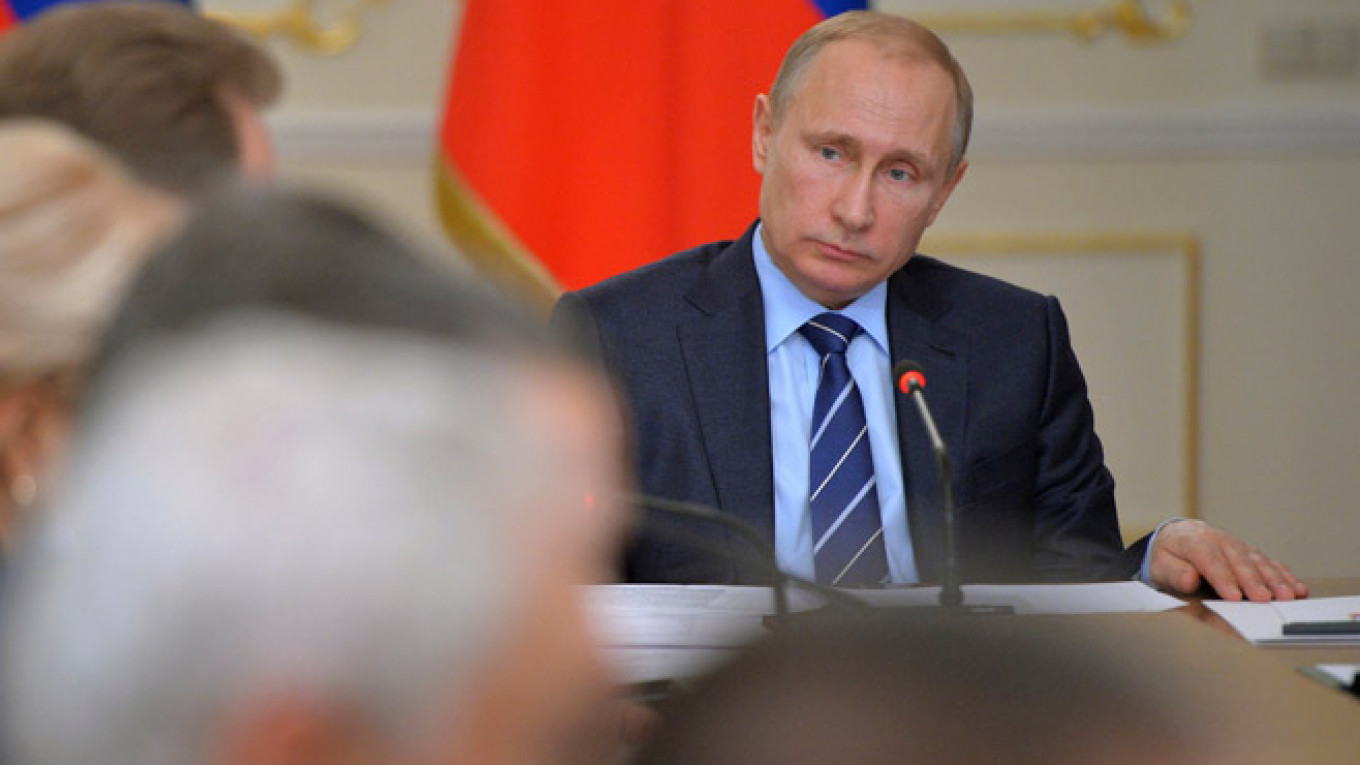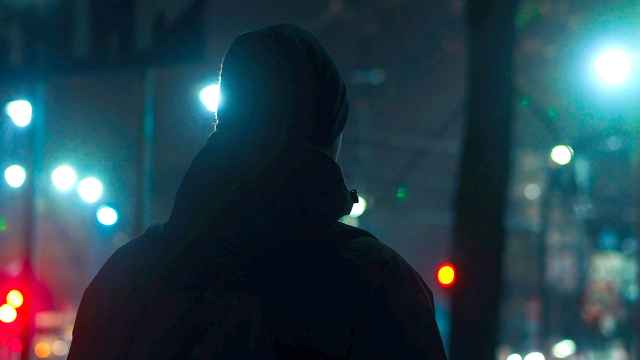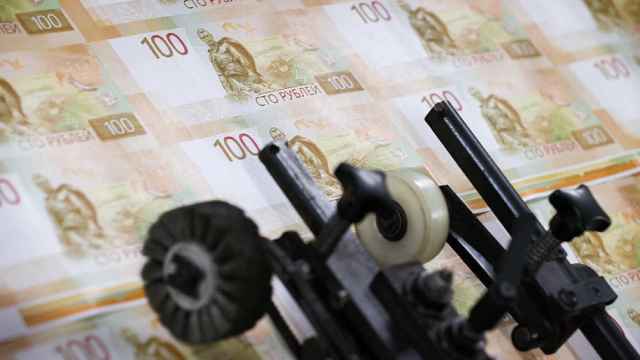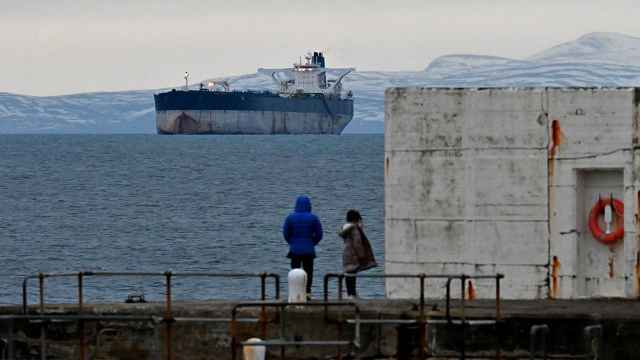Every nation gets the government it deserves, observed Joseph de Maistre, the Sardinian kingdom's diplomatic envoy to the Russian empire, some 200 years ago. He was commenting on Russians' deep-seated political apathy — a trait that persists to this day.
Of course, Russia is no longer an absolute monarchy as it was in de Maistre's time. Nor is it a communist dictatorship, with the likes of Stalin using the threat of the Gulag to discourage political expression. But President Vladimir Putin has learned much from the autocratic tactics of his predecessors, whereas the Russian people seem to have learned nothing.
Putin's seizure of Crimea from Ukraine in March, together with his refusal to bow to the Western powers that disputed the move, made him a hero among ordinary Russians.
In fact, Putin's efforts to recapture Russia's former territory have overshadowed his stifling of non-governmental organizations, repression of independent media, and silencing of opposition voices. Even as Russia's economy collapses — with the ruble having lost more than half of its value against the dollar since June, interest rates rising to 17 percent and inflation reaching double digits — Putin retains an 85 percent approval rating.
Russians should be demanding a solution to their country's economic troubles, not praising the leader who caused them. But Putin, an ex-KGB officer, possesses a dictator's shrewdness. He knows that centuries of tight government control have made Russians obedient. They may fear the government, but they fear being left to fend for themselves even more.
In mid-December, Putin held his annual dinner with the oligarchs — a feast in a time of plague, so to speak. Forty industrial and financial leaders — most of whom manage Kremlin-affiliated firms — attended the event to gain and give reassurance that, together, they and the government would weather the crisis.
At the dinner, Putin reiterated his promise to protect the oligarchs' fortunes from American and European sanctions. Specifically, he pledged to apply the so-called Rotenberg Law, named after Arkady Rotenberg. In September, the Italian government seized $40 million worth of the financier's assets. The law obliges the Kremlin to compensate oligarchs for any foreign assets that they lose as a result of Western sanctions.
These statements built upon a promise Putin made in an interview last month. If Russian businesspeople repatriate their offshore accounts, their financial indiscretions will be forgiven and forgotten.
Relying upon such promises would be financial suicide. Just a few months ago, Putin assured everyone that Russia's economy would weather the European and American sanctions easily. Likewise, during the 1998 financial meltdown, Russian oligarchs lost big — and most never recovered. Clearly, Russia's government cannot be trusted to safeguard anyone's wealth, with the possible exception of that of its own members.
Yet refusing the Kremlin's embrace is equally destructive. After all, in Putin's Russia, political dissent brings financial ruin. In 2003, Russia's wealthiest oligarch Mikhail Khodorkovsky — an opponent of Putin's economic policies — was imprisoned on trumped-up charges of fraud and tax evasion, and his Yukos oil company was driven to bankruptcy, broken up, and sold off to Kremlin cronies.
Ten years later, the message remains the same: If you obey your government, your follies — no business in Russia is free of kickbacks and bribes — will be forgiven. Failure to fall in line will be your downfall, regardless of how wealthy or well-known you are.
Of course, it is not the tycoons who will bear the brunt of the economic crisis. After all, Putin needs their support — as short-lived or ephemeral as it may be — to retain his grip on power.
Ordinary Russians have far less leverage and will suffer far more. But maybe they deserve to suffer. Harsh austerity measures — cuts to pensions, salaries, and social services (including a recent decision to close hundreds of hospitals and lay off thousands of medical personnel) — have inspired barely any criticism.
At the end of December, a few thousand people staged a demonstration in Moscow's central Manezh Square, partly to show support for Alexei Navalny — an anti-corruption lawyer, well-known blogger, and leader of a dwindling opposition movement — and his younger brother, Oleg.
The Navalny brothers had just been sentenced to three and a half years in prison for defrauding a cosmetics company. Alexei, an opponent of Putin on par with Khodorkovsky, received a suspended sentence; Oleg, an apolitical postal executive, will have to serve his full term in prison.
This tactic — to "forgive" one's enemies, while punishing them via their relatives — was a favorite of Stalin's. The "enemy" would quickly come to his or her senses, and the public, unfamiliar with those imprisoned, would quickly lose interest.
They still do. Today's Russians hope that Putin, who blindsided his opponents with his annexation of Crimea, might have another daring trick up his sleeve — one that will stabilize financial markets and revive the oil prices on which Russia's economy depends.
Of course, Russians know enough to worry that Putin has run out of ideas. But that fear does not compare to their dread of what might happen if they rock the boat. And Putin, for his part, understands this well enough to know that he needs no gulags — only the canny use of fear and forgiveness — to retain his grip on power.
Nina L. Khrushcheva, author of "Imagining Nabokov: Russia Between Art and Politics," teaches international affairs at The New School and is a senior fellow at the World Policy Institute in New York. © Project Syndicate, 2015.
A Message from The Moscow Times:
Dear readers,
We are facing unprecedented challenges. Russia's Prosecutor General's Office has designated The Moscow Times as an "undesirable" organization, criminalizing our work and putting our staff at risk of prosecution. This follows our earlier unjust labeling as a "foreign agent."
These actions are direct attempts to silence independent journalism in Russia. The authorities claim our work "discredits the decisions of the Russian leadership." We see things differently: we strive to provide accurate, unbiased reporting on Russia.
We, the journalists of The Moscow Times, refuse to be silenced. But to continue our work, we need your help.
Your support, no matter how small, makes a world of difference. If you can, please support us monthly starting from just $2. It's quick to set up, and every contribution makes a significant impact.
By supporting The Moscow Times, you're defending open, independent journalism in the face of repression. Thank you for standing with us.
Remind me later.






